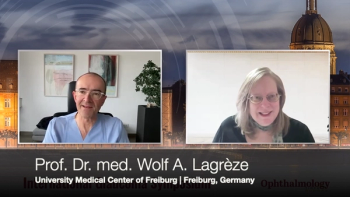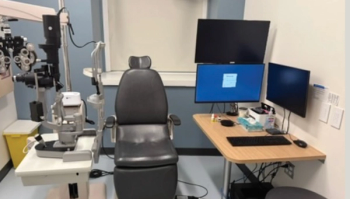
Ultrasound-based therapy effective for refractory glaucoma patients
Ultrasound circular cyclocoagulation is a non-invasive treatment for refractory glaucoma that is approved in Europe.
The treatment is performed using a proprietary system (EyeOP1, EyeTechCare, Rillieux-la-Pape, France) with a control module and a sterile, disposable probe. The probe features six miniaturized 21-MHz ultrasound transducers, a positioning cone and a suction ring.
After the probe is fixated in place, the procedure is initiated via foot pedal control.
Safety studies in animals, which included histologic evaluations, confirm the specificity of the treatment as there were no adverse effects on the iris, crystalline lens, sclera, or conjunctiva.
Clinical experience
Data from hundreds of patients treated for advanced refractory glaucoma show the procedure results in a ≥20% reduction in IOP in about 70% of eyes with primary open-angle glaucoma and that the benefit is maintained for at least 1 year.
"Transscleral cyclophotocoagulation with diode laser has been the cyclodestructive technique of reference for more than 15 years, and it has a very positive impact on patients suffering with refractory glaucoma," said Fabrice Romano, DVM, chief executive officer, EyeTechCare, Rillieux-la-Pape, France. "However, laser energy delivery with transscleral cyclophotocoagulation has low selectivity for the ciliary body and processes, and so the procedure is associated with collateral tissue damage, post-treatment pain, chronic inflammation and visual acuity loss."
In contrast, the new ultrasound-based procedure is associated with excellent tolerability while producing significant IOP lowering in eyes with refractory glaucoma, Dr Romano noted.
Procedure details
The treatment probe comes in three sizes that enable optimal fitting, positioning and treatment regardless of ocular anatomy. After the positioning cone is properly centred, suction is activated, allowing the suction ring to grip the conjunctiva gently and hold the treatment probe in place without distorting the eye.
Surgeons select the treatment parameters (exposure time per shot) using the control module's intuitive touchscreen display. The total treatment time is about 2 minutes per eye.
The treatment is approved in Europe and is being performed in 10 western European countries, including in France where glaucoma specialists at 10 centres are using it as a routine treatment for patients with refractory glaucoma.
It is being investigated in a prospective, interventional study at the Goldschleger Eye Institute, Sheba Medical Center, Tel Aviv University, Ramat Gan, Israel, that enrolled 20 patients with an IOP ≥30 mmHg on maximally tolerated medication and who had failed at least one filtering surgery.
Mean pre-treatment IOP was 36.4 mmHg and was reduced to 18.6 mmHg at 1 week. At 1 year of follow-up, 4 patients had been re-treated, mean IOP for the 20 eyes was 22.5 mmHg, and the procedure was considered a success (>20% reduction in IOP) in 65% of eyes.
"Our centre often treats glaucoma patients in whom other procedures have failed," said Dr Shlomo Melamed, professor of ophthalmology, Tel Aviv University. "Our experience with [this ultrasound-based procedure] indicates it is an effective and well-tolerated therapeutic modality for that population. However, we believe it has definite potential for earlier use in glaucoma care."
Data from 1 year of follow-up are also available for 52 eyes with refractory glaucoma enrolled in a multicentre study in France. Eligible eyes had IOP >21 mmHg after one or more filtering surgeries. The study eyes were divided into two groups that varied by treatment exposure time (4 or 6 seconds per shot). IOP in the two groups averaged 30.3 and 29 mmHg, respectively, at baseline and was reduced by an average of 10 mmHg at 12 months in both groups, with success rates of 63% and 44%, respectively.
Newsletter
Get the essential updates shaping the future of pharma manufacturing and compliance—subscribe today to Pharmaceutical Technology and never miss a breakthrough.




























